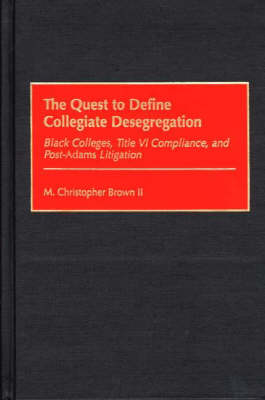
The Quest to Define Collegiate Desegregation
Black Colleges, Title VI Compliance, and Post-Adams Litigation
Seiten
1999
Praeger Publishers Inc (Verlag)
978-0-89789-608-5 (ISBN)
Praeger Publishers Inc (Verlag)
978-0-89789-608-5 (ISBN)
In this work, the author outlines and explains the statutory and legal foundations of collegiate desegregation, traces the historical development of remediation, and analyzes the past and present efforts at compliance.
In 1954, the United States Supreme Court's ruling in Brown v. Board of Education Topeka (347 U.S. 483) overturned the prevailing doctrine of separate but equal introduced by Plessy v. Ferguson (163 U.S. 537) fifty-eight years prior. By the time Brown was decided, many states had created dual collegiate structures of public education, most of which operated exclusively for Caucasians in one system and African Americans in the other.
Although Brown focused national attention on desegregation in primary and secondary public education, the issue of disestablishing dual systems of public higher education would come to the forefront two years later in Florida ex rel. Hawkins v. Board of Control (350 U.S. 413 [1956]). However, the pressure to dismantle dual systems of public education was not extended to higher education until the passage of the Civil Rights Act of 1964. Despite Title VI of this Act, which stated that No person in the United States shall, on the ground of race, color, or national origin, be excluded from participation in, or be denied the benefits of, or be subjected to discrimination under any program or activity receiving Federal financial assistance, nineteen states continued to operate dual systems of public higher education. The Quest to Define Collegiate Desegregation explores the evolution of the legal standard for collegiate desegregation after Adams v. Richardson (351 F2d 636 [D.C. Cir. 1972]).
In 1954, the United States Supreme Court's ruling in Brown v. Board of Education Topeka (347 U.S. 483) overturned the prevailing doctrine of separate but equal introduced by Plessy v. Ferguson (163 U.S. 537) fifty-eight years prior. By the time Brown was decided, many states had created dual collegiate structures of public education, most of which operated exclusively for Caucasians in one system and African Americans in the other.
Although Brown focused national attention on desegregation in primary and secondary public education, the issue of disestablishing dual systems of public higher education would come to the forefront two years later in Florida ex rel. Hawkins v. Board of Control (350 U.S. 413 [1956]). However, the pressure to dismantle dual systems of public education was not extended to higher education until the passage of the Civil Rights Act of 1964. Despite Title VI of this Act, which stated that No person in the United States shall, on the ground of race, color, or national origin, be excluded from participation in, or be denied the benefits of, or be subjected to discrimination under any program or activity receiving Federal financial assistance, nineteen states continued to operate dual systems of public higher education. The Quest to Define Collegiate Desegregation explores the evolution of the legal standard for collegiate desegregation after Adams v. Richardson (351 F2d 636 [D.C. Cir. 1972]).
M. CHRISTOPHER BROWN II is Assistant Professor of Higher Education in the Department of Educational Organization and Leadership at the University of Illinois at Urbana-Champaign./e Professor Brown has published in the areas of equity and access in postsecondary education.
Foreword by Charles V. Willie An Introduction to the Quest Black Colleges and Desegregation The Unfinished Quest for Compliance Desegregation Litigation Reborn Legal Standards for Compliance Challenges to Compliance Defining Collegiate Desegregation Afterword by Robert M. Hendrickson Appendix A: Glossary of Legal Terms Appendix B: A Note on Methodology Bibliography Index
| Erscheint lt. Verlag | 30.5.1999 |
|---|---|
| Sprache | englisch |
| Themenwelt | Recht / Steuern ► EU / Internationales Recht |
| Sozialwissenschaften ► Pädagogik ► Allgemeines / Lexika | |
| Sozialwissenschaften ► Pädagogik ► Bildungstheorie | |
| Sozialwissenschaften ► Pädagogik ► Erwachsenenbildung | |
| Sozialwissenschaften ► Soziologie | |
| ISBN-10 | 0-89789-608-4 / 0897896084 |
| ISBN-13 | 978-0-89789-608-5 / 9780897896085 |
| Zustand | Neuware |
| Haben Sie eine Frage zum Produkt? |
Mehr entdecken
aus dem Bereich
aus dem Bereich
Eine neues Menschsein für die Welt von morgen
Buch | Softcover (2023)
Vahlen (Verlag)
24,90 €
Einführung in die Theorie transformatorischer Bildungsprozesse
Buch | Softcover (2023)
Kohlhammer (Verlag)
34,00 €


